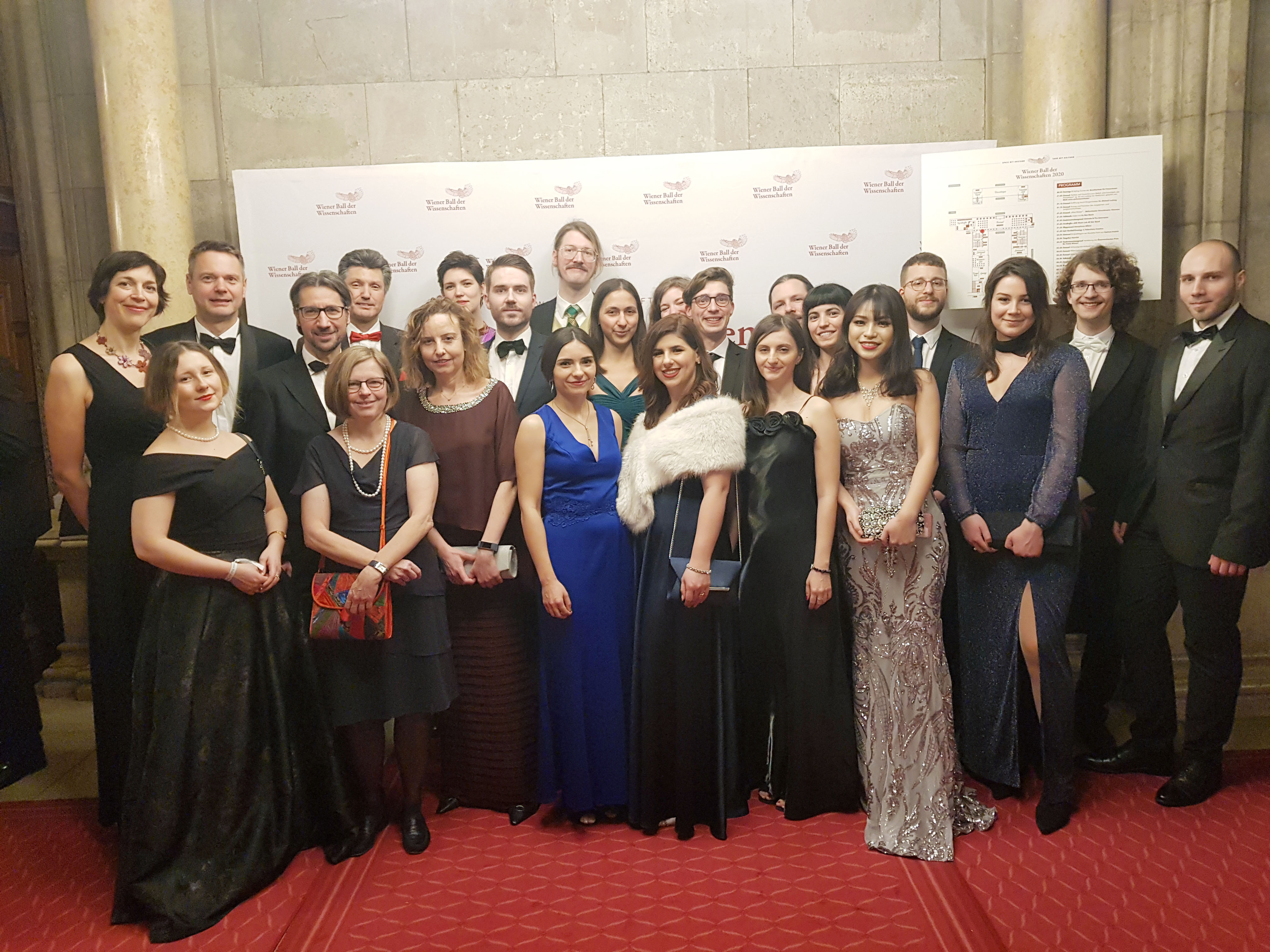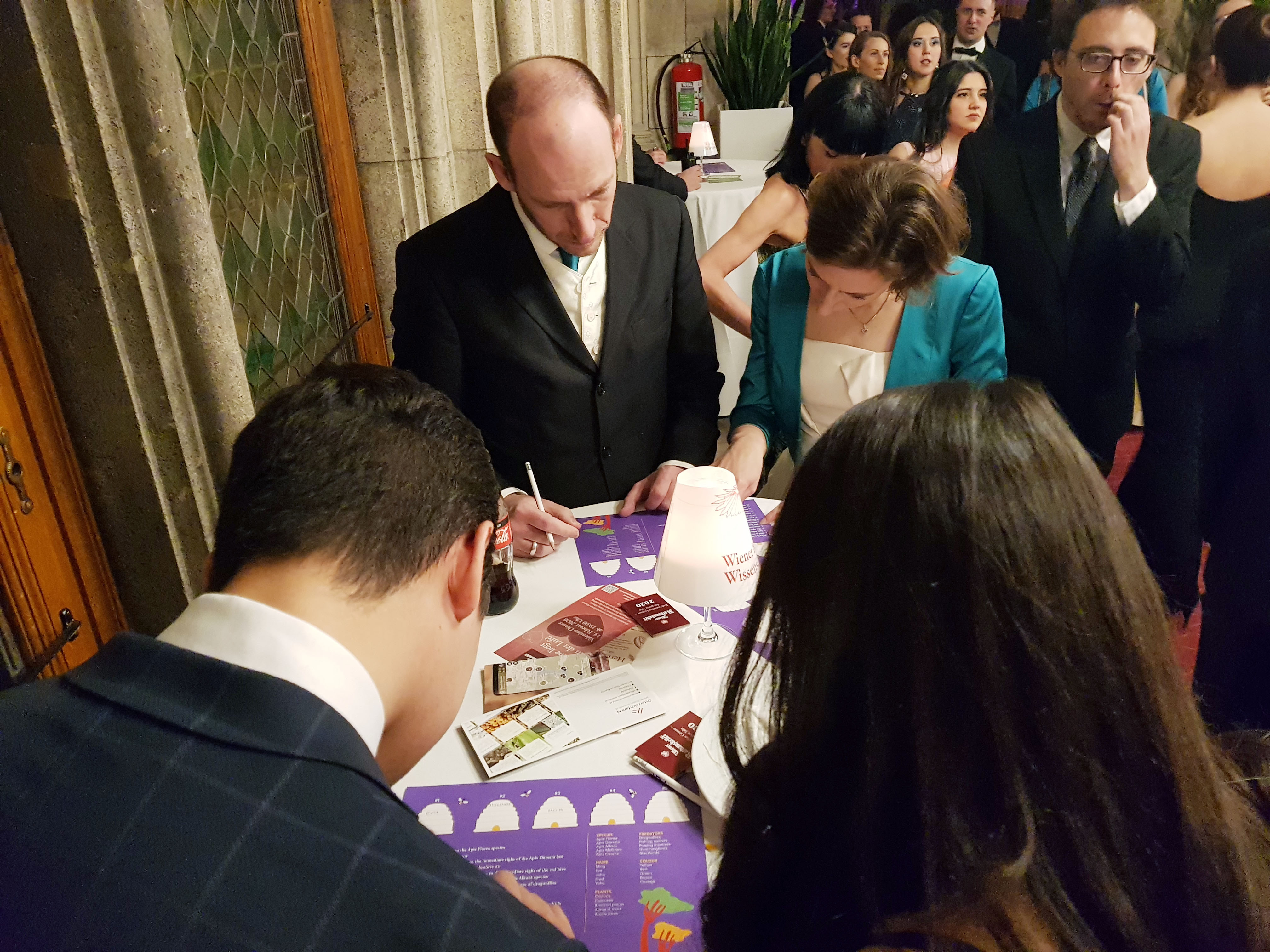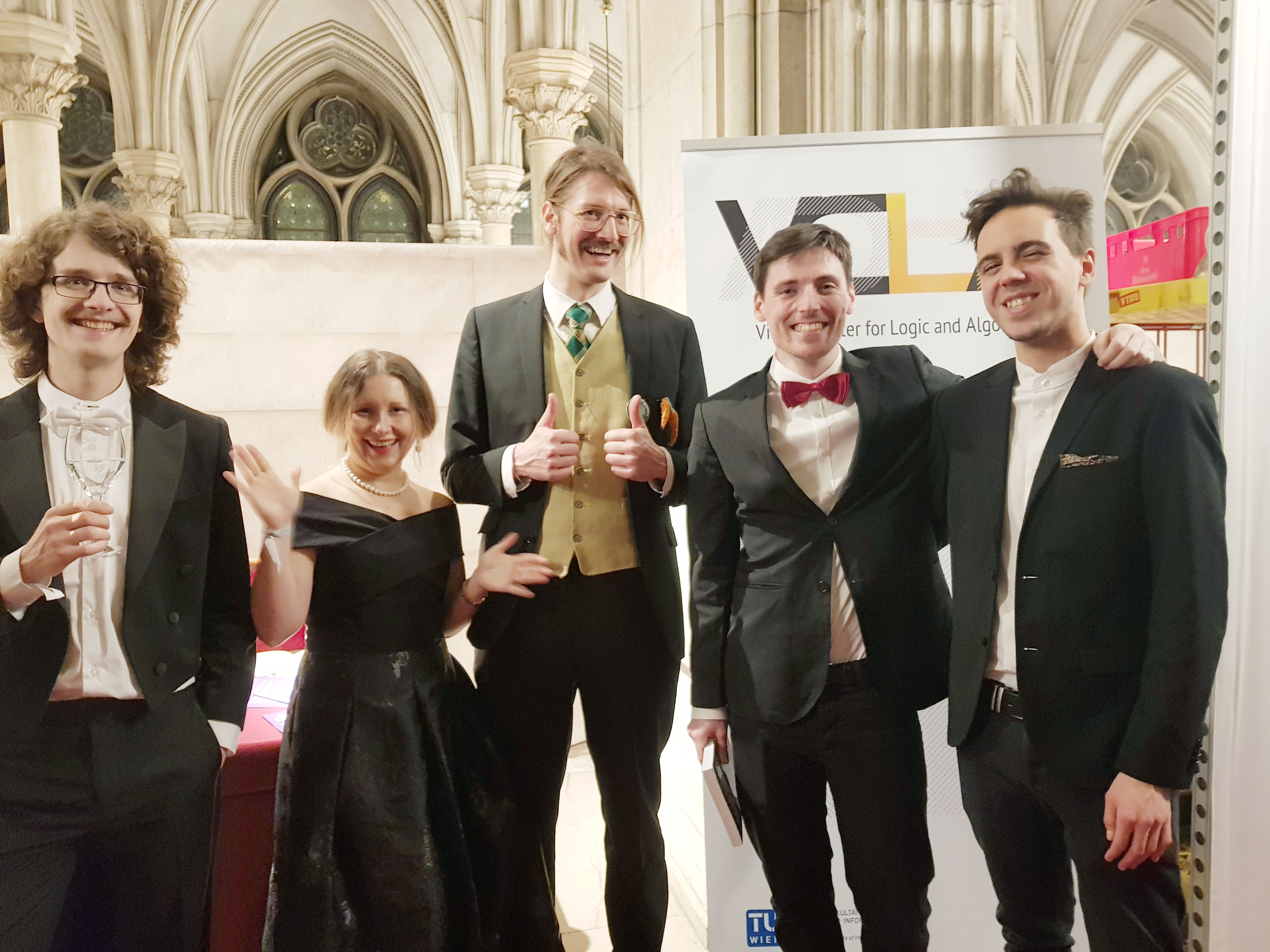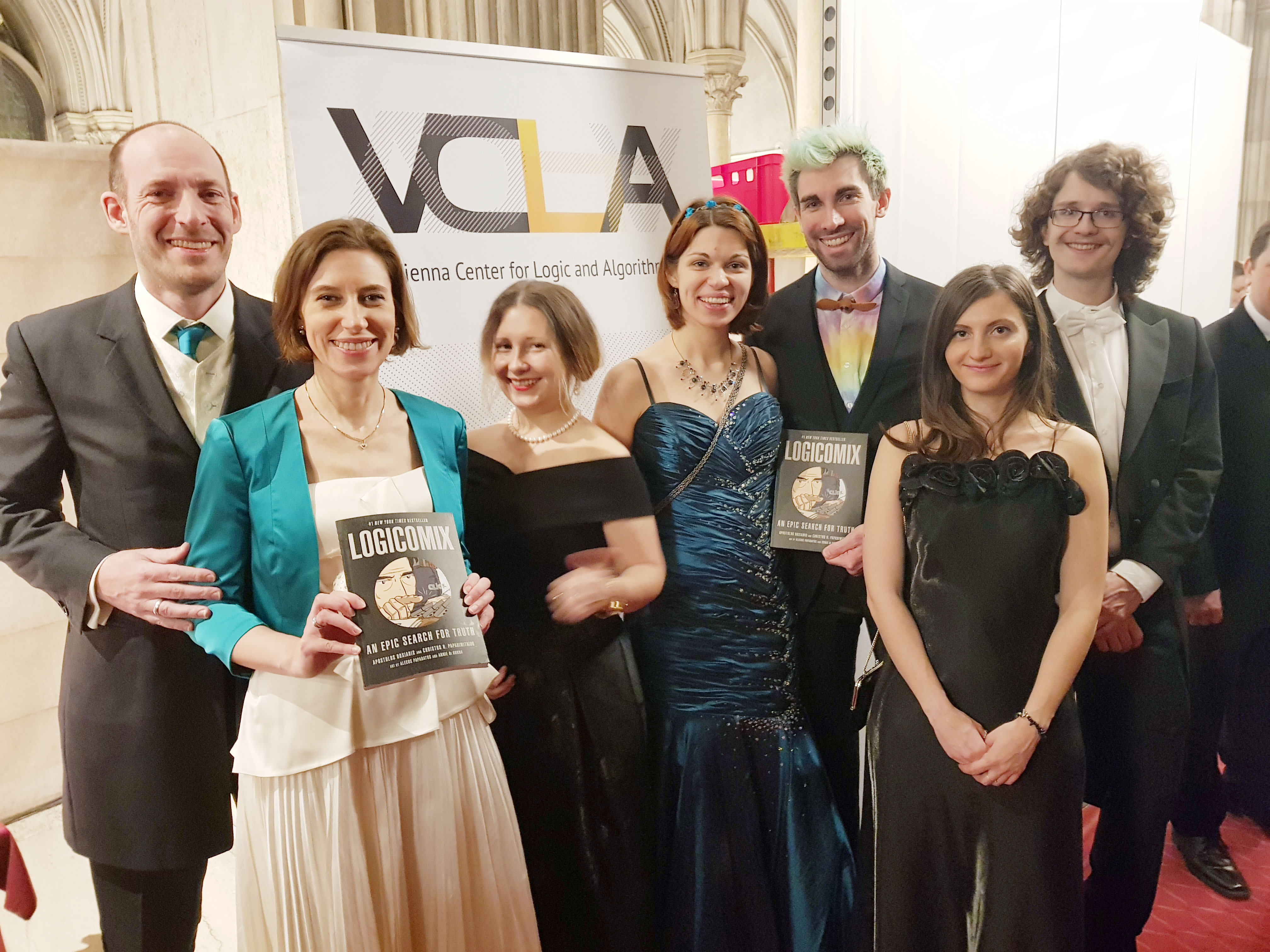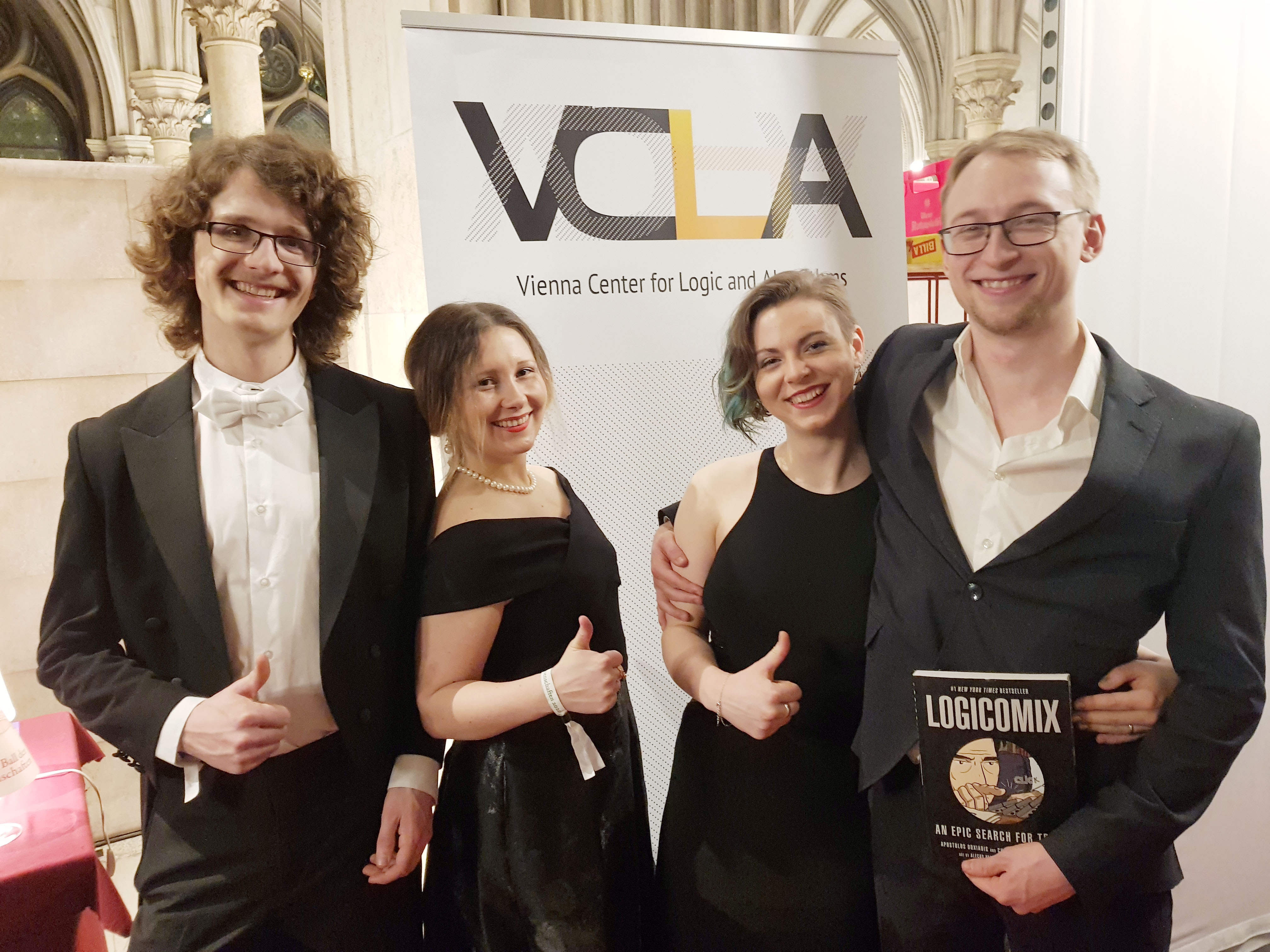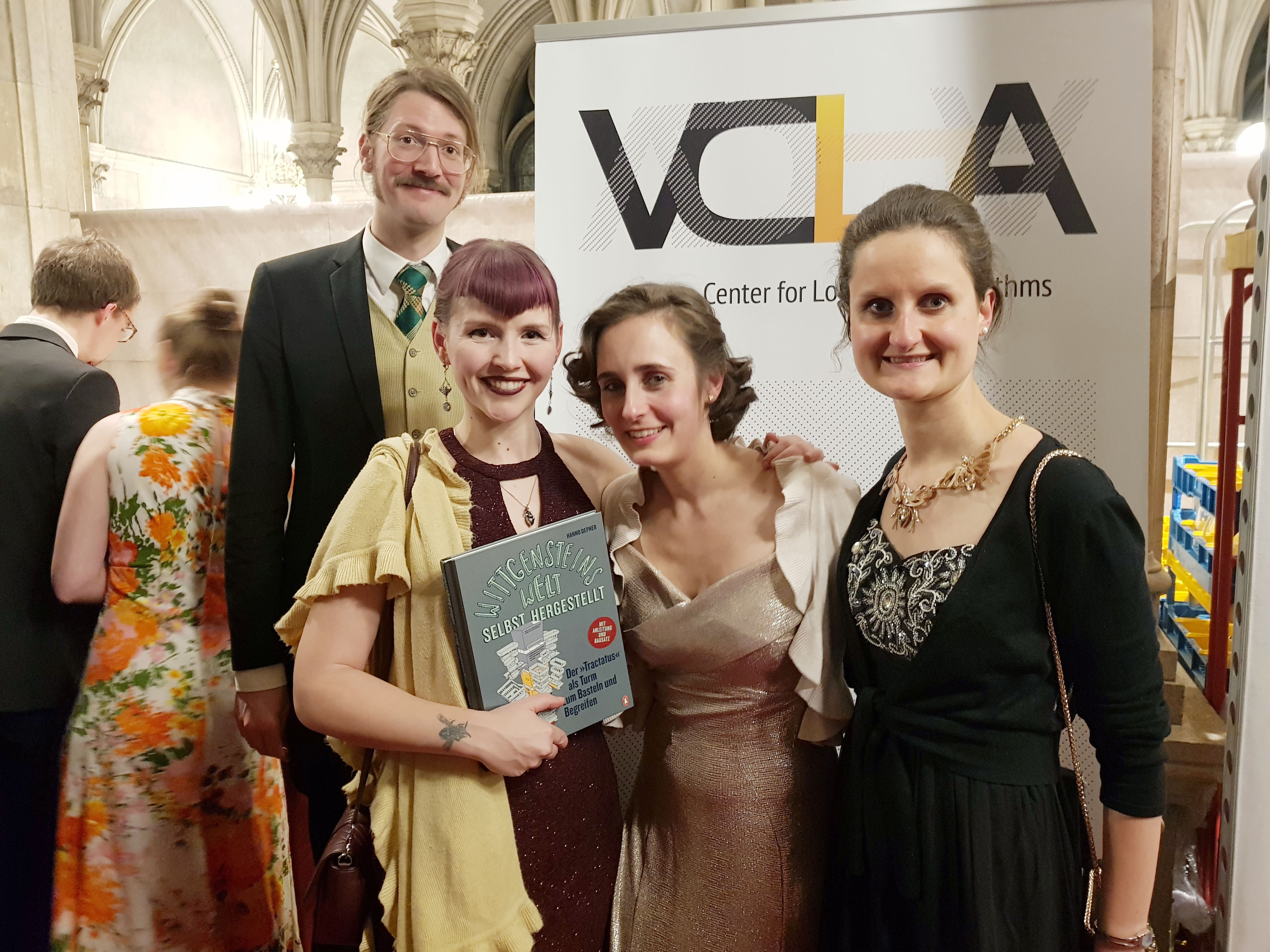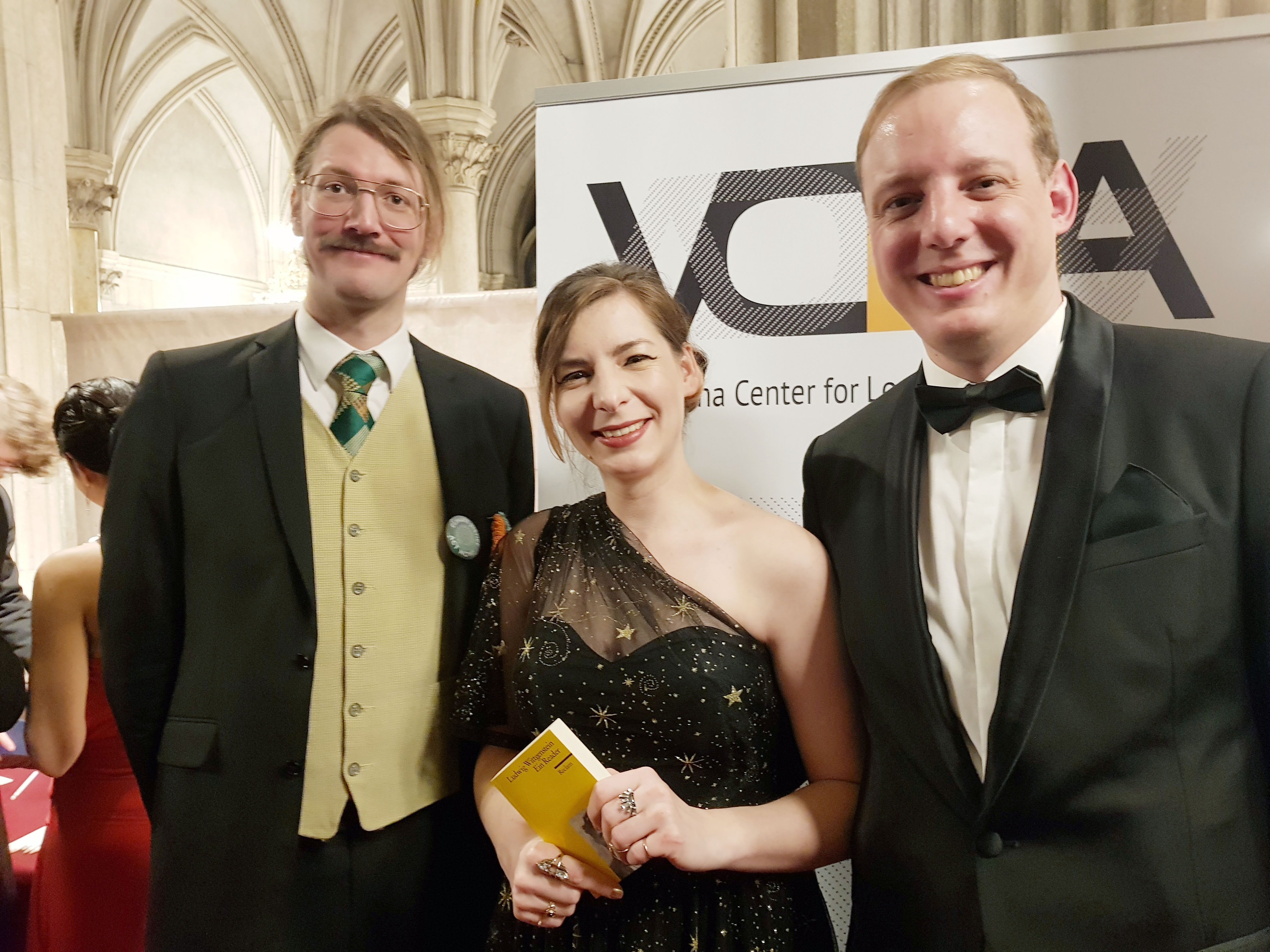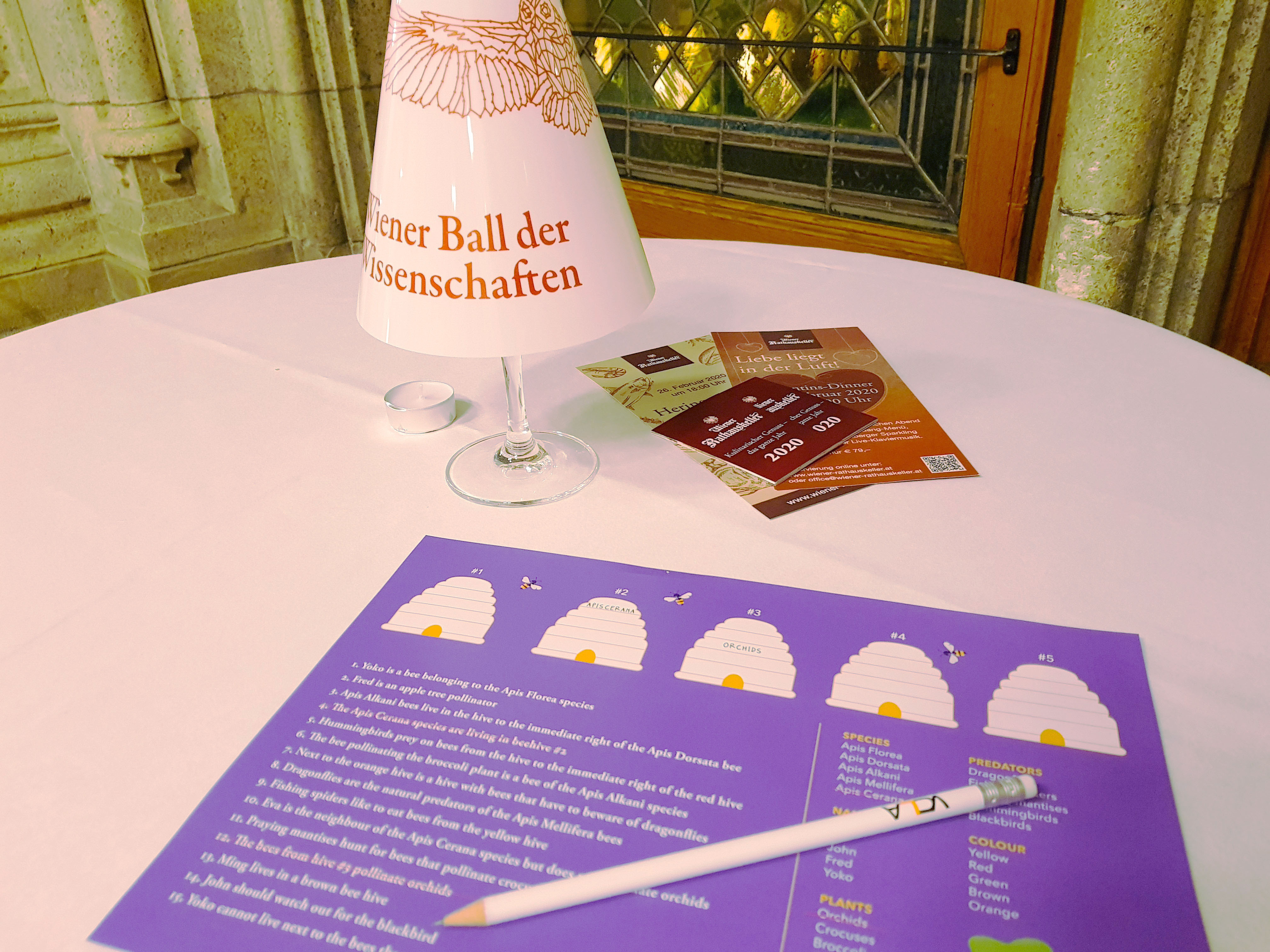Vienna Ball of Sciences 2020 (6. Wiener Ball der Wissenschaften)
Since 2015, the Vienna Center for Logic and Algorithms is a proud partner of the Vienna Ball of Sciences. The cooperation was co-initiated by the late Prof. Helmut Veith. VCLA has in collaboration with researchers and doctoral candidates of the FWF funded doctoral college Logical Methods in Computer Science – LogiCS contributed to the ball´s scientific character with activities that stir curiosity, such as logic riddles and human-machine interaction.
Since 2015 the scientific community in Austria gets together in the glamorous setting of the Vienna City Hall. Even though the series of the Vienna Ball of Sciences is still a bit wet under the nose, it has become one of Vienna’s highlights during the waltzing season, combining entertainment with numerous displays of academic humor and attitude which goes beyond the linguistic, ethnic, gender, and academic borders.
Einstein’s logical riddle for the Vienna Ball of Sciences 2020
A logician and computer scientist, Kees van Berkel, gave the attendees of this year’s Vienna Ball of Sciences a chance to try to solve his adaptation of the legendary Einstein riddle – the Bee puzzle. The puzzle was a result of the traditional cooperation between the Vienna Center for Logic and Algorithms of TU Wien and the annual “Waltzing for science” (Vienna Ball of Sciences), which took place on January 25, 2020, in the Vienna Town Hall.
The doctoral candidates of the FWF funded doctoral program Logical Methods in Computer Science (LogiCS), Rafael Kiesel and Alexandra Pavlova, were next to the author of the Bee puzzle, Kees van Berkel, checking the answers to the Bee puzzle at the VCLA booth.
The first ball attendees who successfully solved the puzzle received their own copy of the graphic novel created by Apostolos Doxiadis, Logicomix: An Epic Search for Truth, or the copy of the Wittgesteins Welt by Hanno Depner, allowing the reader to compile the Wittgesteins Tractatus in 3D format.
The Bee Puzzle
“If the bee disappeared off the face of the Earth, man would only have four years left to live,” is a quote, usually attributed to Albert Einstein. The origin of the Zebra puzzle, commonly referred to as Einstein’s riddle, has been accredited to Einstein as well. Unfortunately, there is no evidence for either of the claims.
Nevertheless, the Zebra puzzle was widely popularized throughout the previous century, and up to the present day, knows many variations. Legend has it that only a small portion of the world population is able to solve it. Kees van Berkel: “I modified the so-called Zebra puzzle and adjusted it to the theme of this year’s Vienna Ball of Sciences: Bees and biodiversity. The “Bee Puzzle’’ is the result. Just like with the original puzzle, with basic logical reasoning, one will be able to solve it.”
In general, logical reasoning is the act of deriving new information (conclusions) from given information (premises) based on some stipulated set of logical rules. Even some forms of logical reasoning can be ascribed to other creatures in the animal kingdom: for example, when Pavlov’s dog started salivating at the sound of the bell, or when bees learn from other bees which flowers hold the sweetest nectar. “The tricky part of the Zebra Puzzle consists in what is called hypothetical reasoning’’, says Kees, “Hypothetical reasoning is a technique involving logical reasoning over statements which are assumed to be true, without necessarily being so. In the puzzle, whenever we make such an assumption and our continued reasoning leads us to a contradiction, we know that the assumption was wrong and we conclude that we must take a different path in solving the puzzle. The Zebra Puzzle is quite a challenge for most people because it requires “nested” hypothetical reasoning. That is, sometimes we need to make assumptions inside our assumptions before we are able to arrive at a contradiction.”
About the author, Kees van Berkel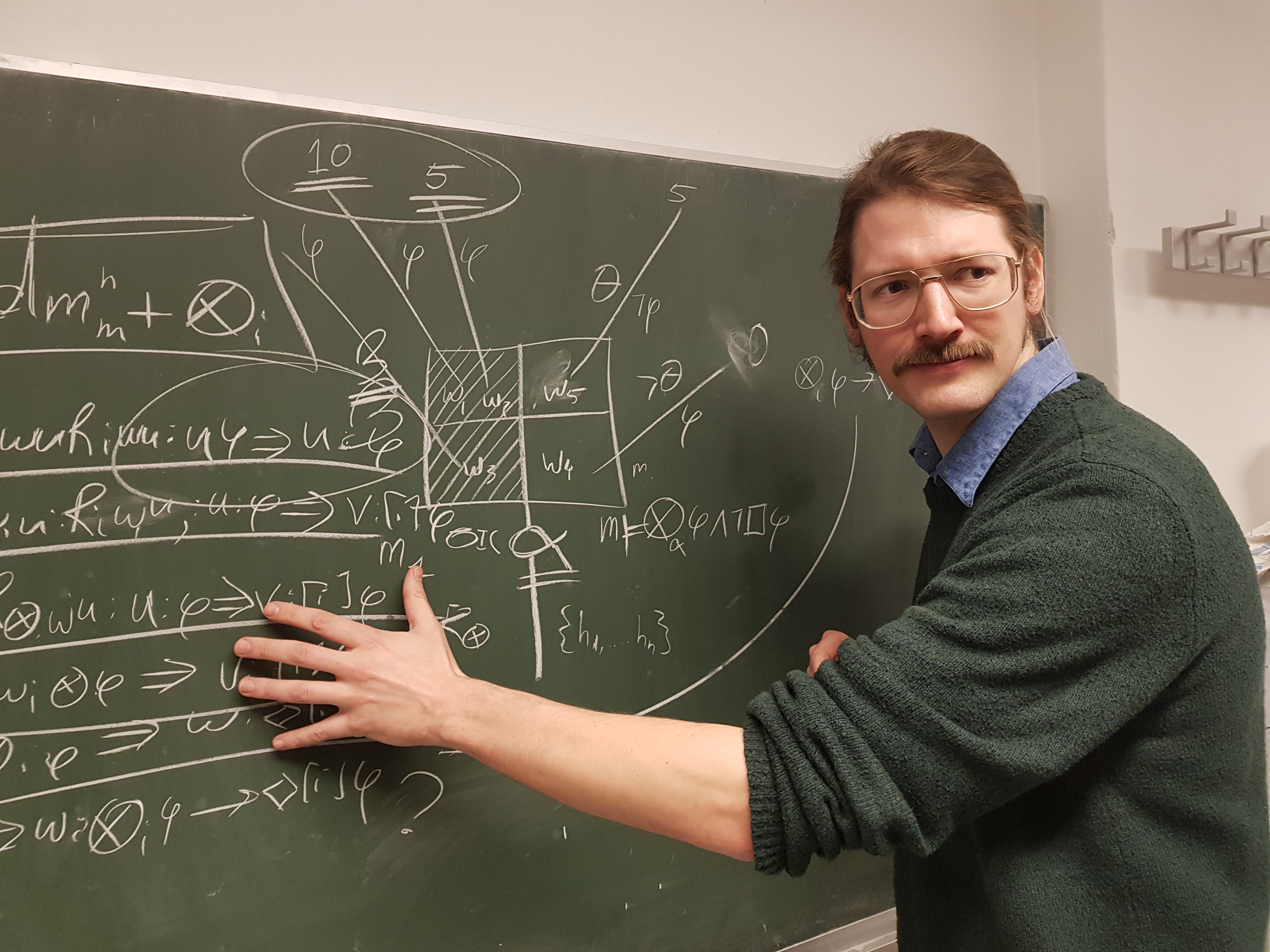
Kees van Berkel, the author of the Bee Puzzle, is a doctoral candidate of the FWF funded doctoral program Logical methods in Computer Science – LogiCS, which is run jointly by the TU Wien, TU Graz and JKU Linz. Kees is working mainly on Logics of Agency and Normative Reasoning. Kees: “Normative reasoning is the form of reasoning humans participate in whenever they ask themselves the question “What should I do?’’, whether this is in relation to law, ethics or morality.’’ With the increasing development of intelligent artificial systems, such as computer-aided legal analysis and self-driving cars, the development of logical reasoning tools for normative decision-making has become more important. Especially in the fairly novel field of artificial agents and autonomous systems we find a growing need for formal tools, such as mathematical logic, that would enable such agents to reason about other agents, the choices they have, and the actions they are legally and morally allowed to perform. Kees van Berkel´s research is focused on the development of suitable proof systems for logics of normative decision making, and is collaborating with his PhD supervisor Prof. Agata Ciabattoni of TU Wien in the project “Reasoning Tools for Deontic Logic and Applications to Indian Sacred Texts” funded by the WWTF.
Logic is to computer science as calculus is to physics
Computer scientists are using logic as a tool that enables computer programs to reason about the world. “In the last two decades, Austria is observing the revival of logic, with important contributions from the Institute for Logic and Computation at the Faculty of Informatics at TU Wien, which meanwhile belongs to the five best in the world,” says Georg Gottlob, professor at TU Wien and University of Oxford. In particular, good international visibility of Austrian logicians has been achieved in three research areas of logic. The first area is “Computational Logic”, especially proof theory, complexity theory, and automatic reasoning. The second area is the application of logic to “Databases and Artificial Intelligence”. The third area is “Computer Aided Verification” or “Model Checking”, where computer programs are used to examine algorithms for errors. Under the joint brand “Vienna Center for Logic and Algorithms” (VCLA), the researchers of the cross-Austrian doctoral program LogiCS want to network and position themselves even more strongly, especially internationally.
Past Vienna Ball of Sciences with VCLA
5. Wiener Ball der Wissenschaften (Vienna Ball of Sciences 2019)
4. Wiener Ball der Wissenschaften (Vienna Ball of Sciences 2018)
2. Wiener Ball der Wissenschaften (Vienna Ball of Sciences 2016)
1. Wiener Ball der Wissenschaften (Vienna Ball of Sciences 2015)
